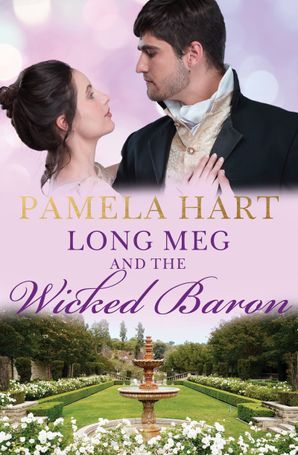From award-winning author Pamela Hart, a warm and witty Regency tale of second chance love.
Little Foxbury, Norfolk, 1818
Meg is in her mid-twenties, grief-stricken and all but on the shelf after the death of her beloved fiance, John. The last thing she expects is an immediate attraction to Nicholas, Lord Ashham, newly arrived in their Norfolk area to take up the title of his departed father – who was indeed a wicked Baron. Artistic Nicholas is cut from a different cloth – can Meg help him escape the stain of the past without damaging her own, spotless reputation, and become a bride at last?
May 1818
Little Foxbury shone in the morning sunshine, the black and white of its Tudor buildings crisp and pleasing, their diamond windows sparkling. Meg Deveny kept a firm hold on Michael’s hand – he was still inclined to run across roads at unexpected times, which was fine on their estate or out in the country, but here in the county seat there were far too many carts, hackneys and coaches for it to be safe.
And noisy! Good Lord, cobblestones might make travel cleaner in the towns, but a dirt track was a lot quieter.
She pulled Michael away from a cobbler’s window where Mr Davies was repairing a brown boot. The two older children stayed for a moment longer, watching the neat stitching with honest admiration.
‘Toby, Violet, come along. We must get to the stationer’s before it closes.’
Violet responded immediately, dragging her younger brother after Meg with brutal efficiency.
‘Can we really get better paints?’ she asked Meg as they came up level.
Meg nodded and smiled at Lord and Lady Mundford, who were passing on the other side of the high street. Lady Mundford was a fading blonde with shrewd green eyes. She returned the nod, and the smile, but frowned a little at the gaggle of children. The Mundford children were rarely seen, let alone heard. Lord Mundford, a stately man of middle age, smiled at her with nicely-judged condescension.
‘Yes, we’ll get better paints. It’s my birthday present to you. And some India ink so you can practice your drawing skills with a little more precision.’
Violet snorted. ‘It’s all very well to say I should be more precise, but how?’
‘That was a very unladylike noise, Violet dear. Please don’t make it in front of your mother or Papa.’ But Violet had a point. There was no drawing master in Little Foxbury – or, indeed, in any surrounding village – who could tutor Violet at the level she deserved.
Her talent was unmistakeable, as was her total devotion to drawing and painting. At only ten years of age, it was quite remarkable, if not always convenient; Meg had had to threaten removal of all drawing materials in order to get her to do her sums. Perhaps the new governess would have better luck, and more knowledge about drawing than Meg did.
But the new governess wasn’t coming until September, when Toby went off to school for the first time.
As they went into the stationer’s, a well-dressed young man came out. He held the door for them, raised his hat to Meg, and smiled at her.
She’d never met him before, so it was rather forward of him. She knew she shouldn’t even acknowledge him, but the man’s hazel eyes had such humour in them she couldn’t bear to give him the cut direct. That smile was irrestistible.
Pushing down an unladylike desire to grin back, she gave the smallest possible nod in return; depressing the pretensions of a mushroom was always hard for her.
‘Who was that?’ Toby asked sternly. Although only eight, he was the eldest boy, her father’s heir, and he took his duties seriously.
‘Never mind,’ Meg said. ‘Let’s see what we can find.’
They spent a lovely half hour in the stationer’s, choosing watercolours, sketching pencils, India ink and a good thick sketch pad which should last Violet at least a month. It had deckled edges so the drawings could be easily mounted and framed, which sent Violet into raptures.
Even the boys enjoyed it; Toby found colouring pencils and Michael a book with drawings of guardsmen and cavalry officers which could be cut out and played with.
And Meg’s own order of the first volume of Gibbon’s Decline and Fall of the Roman Empire had arrived. She had had to order it in her father’s name, as when she had last been in London, the bookseller had assured her that it was ‘quite unsuitable’ for a young lady to read.
With any luck, it would have some information on Roman Britain – if she couldn’t go to Italy, as men did, perhaps she could find some ruins more locally to visit. They had Roman ruins in Bath, didn’t they? The more she understood about the Romans, the more those places would make sense to her.
She and the children walked back to the church with great satisfaction on all sides.
Her stepmamma’s barouche was waiting for them, with Bill Coachman loading some bags of groceries into the luggage space underneath. Polly would have given him a list, no doubt.
‘Here we are, Bill. On time, as promised.’
‘Up you go, Miss Meg.’ He pulled down the steps, she went up first, and the children scrambled in after. She would have to give Violet some lessons in how to enter a carriage gracefully … actually, that was a lesson Violet’s mamma would be better placed to give – Meg herself was too tall to be really graceful, and her stepmamma Elspeth was a wisp of a thing; Violet bid fair to be her twin.
The journey home in the afternoon glow was beautiful. After 1816, when the sun had hardly shone, unable to pierce the grey drifts of cloud, and a very wet summer last year, it was uplifting to see a glowing sun. And reassuring to see the crops ripen in the fields after such hardship in the countryside. The hay would be ready for harvest soon.
Halfway home, they were passed by a horseman – that same young man they had met. He had a very good seat, she couldn’t help but notice, and that was a fine mare he was riding. Again, he tipped his hat to her and she nodded very slightly, but Bill was watching, and he frowned at her as the man cantered ahead of them and turned off the road.
‘Now, Miss, don’t you be nodding to that one. That’s the Wicked Baron, that is. You’ll lose your reputation in two shakes of a lamb’s tail!’
‘The Wicked Baron!’ Michael’s eyes were huge. ‘But he’s dead!’
‘We do not call Lord Ashham “the wicked baron”,’ Meg said sternly. ‘It’s most uncouth.’ She paused. She’d better tell them, or they’d get it all wrong and then blurt it out at the worst possible time. ‘The person who was called the wicked baron was the fifth Lord Ashham. The man who just rode past must be the sixth Lord Ashham. The son. His father is dead, Michael. So we should be sorry for him.’
‘If my father was the Wicked Baron,’ Violet declared, ‘I’d be happy he was dead!’
Toby shook his head at her. ‘That’s a very bad thing to say, Violet. You should never be happy that someone is dead.’
The word sent a blade of sorrow through her; every so often she would be reminded that John was dead, and grief would hit her. They had been affianced almost their whole lives – John’s whole life. He had been ill of a canker for years of that life. He had died last January, holding her hand, and she was still in mourning for him, still in her blacks.
While she had been distracted, Toby and Violet had started a long argument about death and whether you could be glad that really evil people were gone from the world because then they wouldn’t hurt anyone else. It lasted all the way home, so Meg leaned back on the squabs and watched the flat green fields go past, the malt houses, the sheep grazing … she did so love the high skies and distances of Norfolk.
But there was a niggle in the back of her mind; how hard it must be for this new baron, burdened with his father’s reputation, which could hardly be worse. There hadn’t been a family in Norfolk which had received the old baron when he was alive, and for good reason. Meg herself, since she was a young woman, had not been made privy to the full details, but words like ‘orgy’ and ‘debauched’ and ‘blatant immorality’ had been whispered.
Certainly it was true that his wife had abandoned him and gone to live in Bath, taking her son with her – and, although such an act would normally have attracted blame and disapproval, the county had united in saying, ‘She had no choice’.
Poor little boy.
Of course, this new baron might be his father’s spit and image, so she would reserve her pity until she knew more – no matter how appealing his smile was. A rake would need an appealing smile, after all.

On sale 03.01.2022




 Brothers of the Vine
Brothers of the Vine Forever Evermore
Forever Evermore Women of W.A.R.
Women of W.A.R.